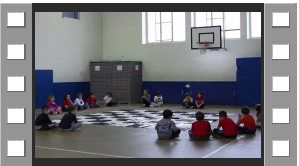Why is Chess a Game?
By Dr. Uvencio Blanco Hernández

“The regular practice of the game of chess stimulates the discipline of its players, who tend to be more organised, structured, punctual, respectful and less likely to fall into bad habits; so this behaviour can become a factor of personal development.”
Chess is a game because it meets a series of requirements typical of games. For example: it is a voluntary activity, it has a specific purpose, it has limits, it is regulated, it models character, it stimulates cognitive skills and reinforces values.
Voluntary activity
Play has emerged universally. It is present in all human beings and therefore in all cultures and in the expression of all normally developing children. In every civilisation and place children play as soon as the opportunity presents itself, doing so in a totally natural and voluntary way. It is part of their lives and perhaps one of the few things they can decide for themselves. In this sense, as a game, chess is a voluntary, disinterested and inconsequential act.
Has a determined purpose
Playing chess is an act in which the subject enjoys himself and obtains pleasure as a consequence of its practice. This implies that it is related to psychological well-being and therefore tends to reduce the risks of suffering some health problems – both physical and mental – such as states of tension and anxiety.
Has limits
The game of chess is expressed in a specific time, context and place. Moreover, while it is being played, the player is governed by certain rules that are different from everyday ones. Respect for rules and objectives is fundamental for development and social integration.
Regulated
The internal order of chess is organised around a series of actions that determine a set of explicit rules, which generates a reality different from the everyday. At the same time, the recognition of the rules contributes to the development of self-control in its practitioners.
Shapes character
Play is a factor in the development of the person as it becomes a lifestyle that leads the individual to make it his or her vocation and, in many cases, his or her profession. In this sense, the regular practice of the game of chess stimulates the discipline of its players, who tend to be more organised, structured, punctual, respectful and less likely to fall into bad habits, so that this behaviour can become a factor of personal development.
Stimulates cognitive skills
One of the most outstanding characteristics of the game of chess and with wide pedagogical applications is related to the stimulation that this activity exerts on the expression of certain cognitive skills. Important research suggests that the game of chess facilitates the development of soft skills such as imagination, creativity and the ability to plan and solve problems.
Promotes values
The game is an appropriate tool to teach values and virtues such as justice, loyalty, self-improvement, coexistence, respect, companionship, teamwork, discipline, responsibility and tolerance to everyone, but particularly to the youngest.
The game is a factor in the development of the person as it becomes a lifestyle that leads the individual to make it his or her vocation and, in many cases, his or her profession. In this sense, the regular practice of the game of chess, due to its strong social character, stimulates the discipline of its players, who tend to be more organised, structured, punctual, respectful and less prone to fall into bad habits, so that this behaviour can become a factor of personal development.
Has a therapeutic function
The therapeutic value of chess lies not only in the pleasure of the fun itself, but also in its capacity to function as an element that releases tension and retained energy.
It has also been observed that children who play chess tend to show higher self-esteem, suffer less from depression and anxiety. Additionally, this activity contributes to coexistence by forcing the player to work as a team, to collaborate with others and to learn that strength lies in the union of many.
Finally, the game of chess acts as an effective non-pharmacological therapy to reduce stress, sleep disorders, depression, anxiety and other disorders that arise throughout life.
Source:
Blanco, U. (2020) “Ajedrez, patrimonio cultural de la humanidad”
Blanco, U. (2023) “Ajedrez, ciencia cognitiva y educación”



